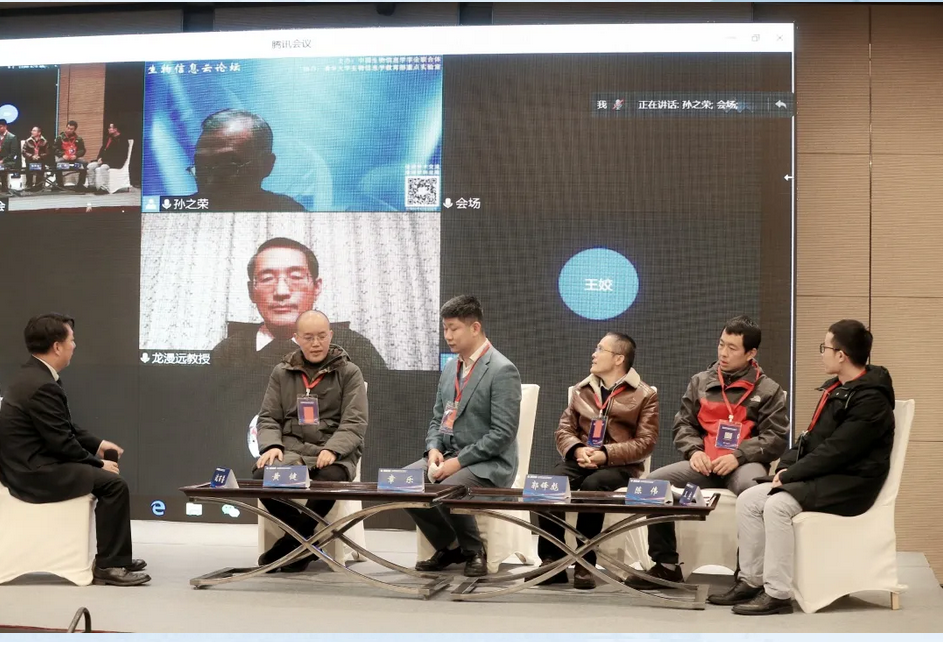Bioinformatics Cloud Forum (12th Session) Successfully Held

Summary of the 12th Bioinformatics Cloud Forum
On December 5, 2020, the 12th session of the China Bioinformatics Cloud Forum was successfully held. The forum invited Professor Manyuan Long from the University of Chicago and Professor Huang Jian from the University of Electronic Science and Technology of China. The report meeting was conducted synchronously through Tencent Meeting (main venue) and Huya Live (branch venue). Professor Sun Zhirong, the person in charge of the Chinese Bioinformatics Society (Preparation) from Tsinghua University, delivered the opening speech for this forum. Invited guests included Professor Chen Wei from Chengdu University of Traditional Chinese Medicine, Professor Guo Fengbiao from the University of Electronic Science and Technology of China, Professor Wang Jie from the Guangzhou Institute of Biomedicine and Health, Chinese Academy of Sciences, and Professor Zhang Le from Sichuan University; Professor Shen Bairong, President of the Sichuan Provincial Bioinformatics Society and West China Hospital of Sichuan University, served as the moderator.
This report meeting was the twelfth lecture of the China Bioinformatics Cloud Forum, hosted by the Chinese Bioinformatics Society (Preparation), and co-organized by the Sichuan Provincial Bioinformatics Society. It aims to promote communication among researchers in the field of bioinformatics and to advance the development of the discipline in China. The forum is held every two weeks, inviting researchers in the field of bioinformatics from both domestic and international to share research findings and discuss cutting-edge issues.
Professor Manyuan Long: "Challenging Dogma: The Origin of Essential Genes and the Evolutionary Basis of Developmental Genetics"
Professor Manyuan Long first systematically introduced the concept and development of new genes and then elaborated on the research work of the team from two theoretical aspects.
Firstly, the team's current research has conceptually confirmed that in fruit flies, the probability of naturally occurring genes generating essential functions is independent of age. Both ancient and young genes have the same probability of producing essential functions, fundamentally and conceptually overturning the basic concepts of molecular biology and developmental biology regarding the essential functions of genes. Using Apollo and Artemis genes as examples, for the first time, the imperfection of natural life is combined with rigorous experiments to illustrate the impact of symmetric sexual conflict selection on the reproductive capacity of fruit flies. A new gene cannot simultaneously meet the needs of both females and males: when it satisfies male functions, it harms females, and when it satisfies female functions, it harms males. The emergence of new functions is not for the production of good genes but is a genetic strategy to cope with the imperfections of life and its own conflicts. This further changes the previously unquestioned belief in the perfect process of life and the erroneous concept that developmental mechanisms are conservative. Subsequent research has been confirmed by scientists in the developmental biology field in many countries, playing an important role in understanding the genetic aspects of developmental mechanisms.
Secondly, he explained the laboratory's theory of escape from inactivation, which controls the directional escape process of genes that regulate male reproductive functions, always moving from the X chromosome to the autosomes. The X and Y chromosomes must satisfy the biological characteristics required for the inactivation process during the formation of male sperm, which inevitably generates selective pressure to choose genes that can help with the basic functions in the production process of male sperm. These genes must exist on the autosomes. The inactivation process of meiotic sex control genes and the gene escape theory have been verified by genome laboratories and fruit fly developmental biology laboratories. The report concluded with a message to scientific "mountaineers" to understand how high the peak of science is and to carry out scientific research that can withstand the test of time.
Professor Huang Jian: "Immunoinformatics: From Basic to Translational"
The content includes two parts: an overview of the field of immunoinformatics and several research works of Professor Huang Jian's research group. Immunoinformatics can be divided into two different directions: artificial immune systems and computational immunology; the former's core issue is to abstract the immune network and immune recognition into artificial intelligence algorithms, while the latter's core issue is epitope prediction. Computational immunology is applied to predict the trends of infectious disease outbreaks, computer-assisted vaccine design, computer-assisted antibody design, computer-assisted TCR design, and immune repertoire research, thereby helping to prevent, diagnose, and treat diseases.
Professor Huang Jian summarized nucleic acid aptamer screening, phage display biopanning, etc., as in vitro simulated immune systems and believes that theories, computational methods, and applications related to biological immune systems, simulated immune systems, and artificial immune systems can all be broadly regarded as research in immunoinformatics.
Professor Huang Jian reviewed the important contributions of domestic research groups and briefly introduced his team's research in the direction of T-cell epitopes, B-cell epitopes, and phage display. He then detailed the application of immunoinformatics in the design and development of diagnostic reagents and drugs such as metuximab, anti-sudan red monoclonal antibody, the antibody receptor fusion protein drug Kangboxi, and antibody-peptide fusion protein drugs. Finally, Professor Huang Jian also showcased the development case of lymphoma differential diagnosis kits based on miRNA profiles from SRA big data.
In the interactive session of the forum, Professors Manyuan Long and Huang Jian, along with four special guests and the live audience, engaged in in-depth discussions. The guests highly praised the two professors' reports and achievements. The professors also promptly answered questions from the live audience in the Tencent Meeting chat room.

